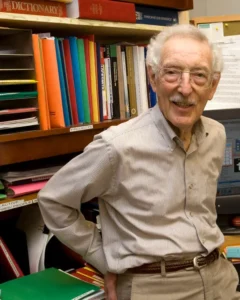Bruce Ames

The Tyler Prize is deeply saddened at the passing of Dr. Bruce N. Ames, biochemist and 1985 Tyler Prize Laureate, on October 5, 2024, at the age of 95. Dr. Ames was a pioneering figure in the field of genetic toxicology recognized worldwide for developing the Ames Test. His work revolutionized the way we identify and regulate carcinogens, leading to safer products and a healthier environment.
It can be easy to take our health and safety for granted. In the 1960s, there were very few rules to protect humans from toxic man-made chemicals. Reading the ingredients list on a box of potato chips in 1964, Ames began to wonder about whether preservatives and other chemicals might cause genetic damage to humans. He realized that many new chemicals were being introduced into the market without adequate testing, and his concern about the potential carcinogenicity of synthetic chemicals led him to conduct decades of research:
“To put it simply, Bruce realized that it was entirely possible that the chemical preservatives in potato chips could cause cancer in humans without anyone knowing. So, he wanted to test them to find out if they were mutagens, agents that could damage DNA… the first step towards cancer”.
– Alexis Pedrick, Science History Institute, July 9, 2024
Bruce Ames’ groundbreaking research provided a simple, rapid, and inexpensive method to screen for potential carcinogens known as the Ames Test.
The Ames Test showed that it was possible to quickly and affordably test the toxicity of any chemical. Before this test, checking for cancer-causing chemicals was slow, expensive, and usually involved animal testing, limiting how many chemicals could be tested. The Ames Test used a special type of Salmonella bacteria to screen many chemicals efficiently and cheaply, leading to the discovery and removal of many carcinogens from common products.
Impact of the Ames Test
The Ames Test helped prevent harmful products from reaching the market, protecting consumers and helping companies make safer choices in product development. Thanks to this test, mutagenic impurities were removed from items such as children’s pajamas, copier toner, and hair dyes. Many alive today may owe their health to Bruce Ames and the Ames Test.
Bruce Ames in Life
Born in New York City, Ames joined the faculty at the University of California, Berkeley, where he remained for over three decades. In 2000, Ames moved his research laboratory to the Children’s Hospital Oakland Research Institute, continuing to work there into his 90s.
He is described by his colleagues as an inspirational mentor, fostering the scientific curiosity of young researchers. His generosity and commitment to scientific advancement is evidenced by his decision not to patent the Ames test and his willingness to freely share his bacterial strains with researchers worldwide.
He will be sadly missed by the Tyler Prize community.
